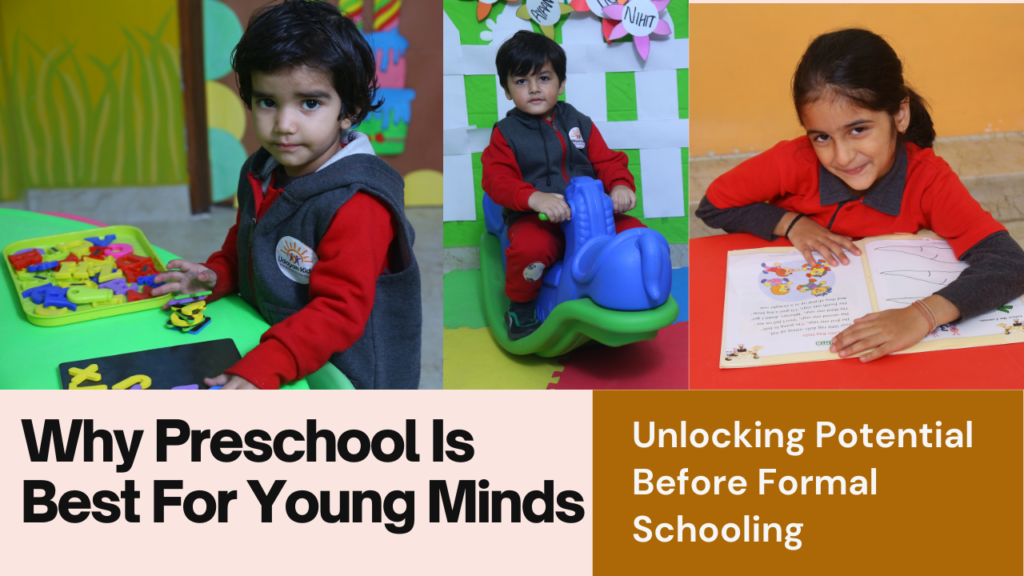
Early Childhood Education: A Foundation for Future Success
Early childhood education is a key foundation for a child’s growth. It sets the stage for future school success, social skills, and well-being. When looking at options for children under 6 years old, preschool is a better choice than formal school. Here’s why:
The Best Preschool and Day Care Center
Play-Based Learning
Preschools focus on play-based learning, which is important for young children’s minds and social growth. Through play, children explore, try new things, and learn about the world. This hands-on method boosts creativity, problem-solving skills, and curiosity—all important for future learning.
Formal schools often start structured lessons too early, which can be too much for young children. Preschools balance structured activities with free play, making sure children learn through fun and age-appropriate activities.
Social and Emotional Development
Preschools offer a caring place where children learn to interact with peers and adults outside their families. They build key social skills like sharing, taking turns, and working together. These early interactions are the foundation for good social relationships and emotional strength later in life.
Formal schools might focus more on academics than social and emotional growth in the early years. Preschools, however, focus on creating a supportive environment where children feel safe to explore their feelings and friendships.
Individualized Attention
Preschools often have fewer students per teacher compared to formal schools, allowing for more personal attention to each child. Teachers can see and respond to each child’s strengths and challenges, adjusting activities to fit each child’s learning pace and interests.
Formal schools might have bigger classes and stricter lesson plans. This makes it hard for teachers to give the same level of personal attention. This can make some children feel unnoticed or struggle to keep up.
Focus on Holistic Development
Preschools nurture all parts of a child’s growth—mind, body, social, emotional, and creative. They use activities like music, art, outdoor play, and sensory experiences to stimulate all areas of growth at once.
Formal schools, especially early on, might focus more on academics. This narrow focus can limit chances for children to explore and grow their interests in different areas.
Smooth Transition to Formal Education
Going to preschool can make the move to formal school easier by getting children used to routines, rules, and social settings. Children who go to preschool often show more confidence and readiness for formal school than those who don’t.
Preschools often work closely with elementary schools to ensure a smooth change. They share information about each child’s strengths, challenges, and learning styles to help teachers provide the best support.
Promotion of Independence and Confidence
Preschools encourage children to be more independent by giving them chances to take care of themselves, make choices, and solve problems in a supportive place. As children gain confidence in their abilities, they are more likely to take part and enjoy learning.
Formal schools, with their stricter structures, might unintentionally slow down the growth of independence and confidence by limiting chances for children to make choices and explore on their own.
Conclusion
Preschools offer a well-rounded and age-appropriate way to early education that is often better for children under 6 years old than formal schools. By focusing on play-based learning, social and emotional growth, personal attention, and overall growth, preschools build a strong base for future school success and lifelong learning.
While formal school is important, the early years are a critical time for nurturing curiosity, creativity, and social skills in a caring place. Choosing a preschool that follows these ideas can greatly enhance a child’s growth and readiness for school.
Udayan Kidz shines in early childhood education by focusing on overall growth, play-based learning, social-emotional growth, personal attention, and preparation for school. By following these principles, Udayan Kidz creates a nurturing place where children can grow, find their passions, and build a strong foundation for future success.
Choosing Udayan Kidz for your child’s early education means investing in a program that meets and exceeds the developmental needs of young children. With a commitment to excellence and a passion for nurturing young minds, Udayan Kidz shows the power of early childhood education in shaping the leaders and innovators of tomorrow.




